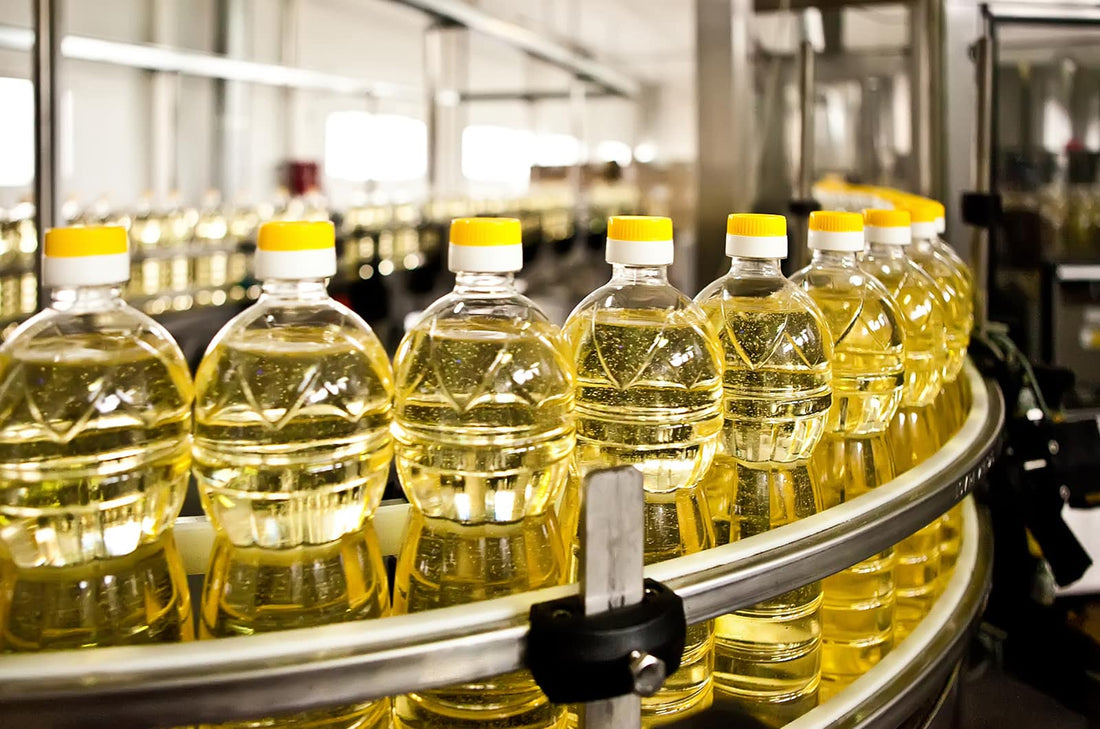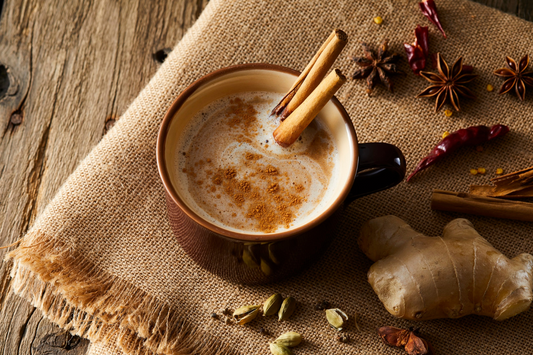Industrial seed oils such as soybean, corn, and canola oil are highly processed and linked to chronic diseases like heart disease, obesity, and inflammation. These oils are high in omega-6 fatty acids, which can overwhelm the body’s natural balance with omega-3s. While seed oils are ubiquitous in processed foods and restaurants, there are healthier fat alternatives like olive oil, coconut oil, butter, and tallow. Avoiding processed foods, grain-fed meat, and restaurant oils is key to reducing seed oil intake and improving long-term health.
Looking up "seed oils" in any search engine brings up claims that seed oils are inflammatory, damaging to the gut, and contain undesirable components formed during refining processes.
Many Americans heavily ingest seed oils, and we'll explain why it should concern everyone.
If you didn't know already, research has shown that industrial seed oils play a significant role in the abundance of chronic diseases, but they're tough to avoid. In addition to their use in cooking and baking, they're in many processed foods, including salad dressings, margarine, and mayonnaise.
What are Industrial Seed Oils?
Soybean, corn, rapeseed (derived from canola oil), cottonseed, and safflower are all highly refined vegetable oils. Even worse, seed oils are usually GMOs (genetically modified organisms).
After harvest, the seeds are heated to extremely high temperatures that oxidize the fatty acids. Following heavy processing, these oils contain oxidized byproducts, synthetic preservatives, and chemical residues that are (as you can imagine) harmful to your health.
They are calorie packed and nutritionally barren. In the last hundred years, industrial seed oils made their way into every average American diet, in contrast to more traditional fats like olive oil, coconut oil, butter, and ghee.
Americans started consuming industrial seed oils in the early 1900s, then swiftly began replacing animal fats with their seed counterparts. They're deeply ingrained in our food system, used in virtually all ultra-processed packages and frozen foods. A vast majority of restaurants use them too! After all, they are cheap.
They're not entirely useless, though! Canola oil, for example, makes for an excellent lubricant for machinery. Seed oils are making their way through scientific development as alternatives to non-renewable petroleum products (for fueling cars, making plastic, and even formulating printer ink). But should we be eating them? Let’s take a closer look.
Polyunsaturated Fats in Seed Oils Overwhelm the Body
Our reliance on efficiency, shortcuts and fast, processed foods makes it practically impossible to avoid polyunsaturated fats. Because they ingested numerous wild (unprocessed) foods with saturated fats, our forefathers consumed significantly more omega-3s.
According to some experts, "seed oils are absolutely bad for you" and we’ve pushed the scales toward polyunsaturated fats. Seed oils are a major source of omega-6 fatty acids, which contribute to chronic inflammation and a host of health problems when ingested in excess including but not limited to:
- Obesity
- Heart Disease
- Worsening Asthma
- Diabetes
- Autoimmune Diseases
- Arthritis
- Mental Illness8
- Inflammatory Bowel Disease
- Infertility
- Osteoarthritis
- Eye Problems, Even blindness
- Cancer
- Other Serious Illnesses
To add insult to injury, the health benefits of omega-3 are nullified when omega-6 is consumed in excess. Ensure nutritional balance by consuming foods high in omega-3.
What’s the balance look like? PUFAs (Polyunsaturated Fatty Acids) are not intrinsically harmful. In truth, PUFAs are encouraged in appropriate proportions - but we need a balance of the two types.
Avoid Vegetable Oils High in Omega-6
Too much omega 6 can raise your blood pressure, lead to blood clots that can cause heart attack and stroke, and cause your body to retain water.
Consider avoiding the following plant oils due to their high omega-6 contents:
- soybean oil
- corn oil
- cottonseed oil
- peanut oil
- sesame oil
The Gut-Skin Connection
Your gut and skin actually have a lot in common – Both form an interface between the internal body and the outside environment and are home to trillions of bacteria which interact with you in different ways.
Though the exact mechanisms are not yet fully understood, numerous studies indicate that the gut microbiome's influence extends well beyond the digestive system. Your skin is one of several organs which has a complex connection with your gut. This connection is also known as the gut-skin axis.
The food you eat affects the diversity of your gut microbiome and may also trigger skin irritations or flare-ups in some people. Food, supplements, medication, and anything you consume can reach your gut and affect your microbiome.
How to Avoid Industrial Seed Oils
The first step is banishing industrial seed oils from your diet. So, it’s time to clean out your pantry and get rid of any bottles of canola, corn, cottonseed, soybean, safflower, or peanut oils you have hidden away. These oils are not “healthy,” despite misleading claims that may appear on their labels!
The second step is to stop eating processed foods – These are a significant source of industrial seed oils! Also, try to reduce your consumption of restaurant foods, which are typically cooked in repeatedly heated industrial seed oils.
Finally, the final step is to avoid eating grain-fed meat. There is evidence to suggest that grain-fed animals may accumulate the toxic byproducts of industrial seed oils, which comprise a large part of their diet, in their meat; when you eat this meat, you too may become a repository for lipid peroxides and other harmful byproducts of industrial seed oils.
Six Fats You Should Be Cooking With
Look at the types of fats our ancestors have used for thousands of years – olive oil, coconut oil, and animal fats are natural, wholesome sources of fatty acids for nourishing our bodies.
Here’s a quick breakdown of the types of fats we recommend:
Extra Virgin Olive Oil
Olive oil has been a part of the human diet for thousands of years. It’s rich in the antioxidant vitamin E and polyphenols, with a wide range of health-promoting properties, including cardio protective and anti-diabetic properties. One tablespoon of olive oil contains 1.9 grams of saturated fatty acids (SFAs), 9.8 grams of monounsaturated fatty acids (MUFAs), and 1.4 grams of PUFAs.
Coconut Oil
Coconut oil is a superfood with many health-promoting properties. It contains medium-chain triglycerides such as lauric acid, a fatty acid that is readily used by the body for energy and has anti-fungal, antibacterial, and antiviral properties. Coconut oil contains 90 percent saturated fat, which makes it very heat stable.
Butter and Ghee
If you tolerate dairy, butter and ghee may be great additions to your diet. Butter and ghee from grass-fed animals contain conjugated linoleic acid, a type of fatty acid with anti-cancer and metabolic health-promoting properties. While butter may contain traces of milk proteins, ghee is usually a safe option even for dairy-sensitive people because all milk constituents are removed in its creation.
Both butter and ghee are composed mainly of saturated fat. One tablespoon of butter contains 7.2 grams of SFAs, 2.9 grams of MUFAs and 0.4 grams of PUFAs, while one tablespoon of ghee contains 8 grams of SFAs, 3.7 grams of MUFAs, and 0.5 grams of PUFAs.
Pastured Lard
This may come as a surprise, but it turns out that lard is mostly composed of monounsaturated fat, the type of fat in olive oil that has been promoted as “heart healthy” by the conventional medical community for decades! Lard, the fat rendered from pigs, is high in saturated fat and is a good substitute for butter in recipes if you can’t tolerate dairy.
One tablespoon of lard contains 5 grams of SFAs, 6 grams of MUFAs, and 1.6 grams of PUFAs. Lard also contains 500 to 1000 IU of vitamin D per serving, depending on what the pigs ate and whether they were exposed to sunlight.
Pastured Tallow
Tallow is fat rendered from meat other than pork, such as beef and bison. It has a high smoke point that makes it great for high-heat cooking. In fact, most restaurants used tallow in their deep fryers until the 1970s, when the industrial seed oil industry usurped the position of traditional fats in our diets. Tallow contains 6.4 grams of SFAs, 5.3 grams of MUFAs, and 0.5 grams of PUFAs in a one-tablespoon serving.
Duck Fat
Duck fat is a delicious traditional cooking oil that also has great versatility. It has a high smoke point, making it great for high-heat cooking, but a delicate flavor and similar fatty acid profile to olive oil. One tablespoon of duck fat has 4 grams of SFAs, 6 grams of MUFAs, and 1.6 grams of PUFAs.
Finally, be sure to incorporate plenty of healthy fats from whole foods into your diet. Soaked and sprouted nuts, avocado, coconut, wild-caught fatty fish, grass-fed meats, and wild game are all excellent sources of healthy fats and can be incorporated into your diet in countless ways.
Note: When you’re choosing animal fats for cooking, remember to choose pasture-raised sources because conventional alternatives are significantly higher in omega-6s.
Bottomline
Despite how readily available seed oils might be in today’s market, increasing research shows that we should strive to find alternatives. The rapid increase in the production of industrial seed oils over the past century has led to a health decline in populations consuming Westernized diets.
It’s important to note that not all plant oils harm your health. For example, coconut oil and olive oil are both excellent choices!
Frequently Asked Questions
What are industrial seed oils?
Industrial seed oils are highly processed vegetable oils such as soybean, corn, canola, cottonseed, and safflower oil. They're refined using high heat and chemicals, leading to oxidation and the formation of potentially harmful byproducts.
Why are seed oils considered unhealthy?
These oils are high in omega-6 fatty acids, which, when consumed excessively, can cause inflammation, disrupt the omega-3 balance, and contribute to chronic diseases like heart disease, diabetes, and cancer.
Are there any healthy alternatives to seed oils?
Yes, healthier fat options include olive oil, coconut oil, butter, ghee, tallow, lard, and duck fat—especially when sourced from pasture-raised animals or cold-pressed plants.
How can I avoid seed oils in my diet?
Read ingredient labels carefully, cook at home with traditional fats, avoid processed and fast foods, and choose pasture-raised meats to reduce omega-6 intake.
Is all omega-6 fat bad?
Not inherently. Omega-6 is necessary in small amounts, but the problem lies in its disproportionate ratio to omega-3 in modern diets, which causes inflammation and health risks.





210 comments
Very informative, learned a lot that I never knew about chemicals in our soap that are harmful. Thank you!
So disheartening to see how much disinformation has been “fed” to the public for so many years. Here’s to hoping more people find this and other articles that speak the truth. Thank you for that.
Great information
Lots of interesting information! Love this company!
Thank you for the great information!